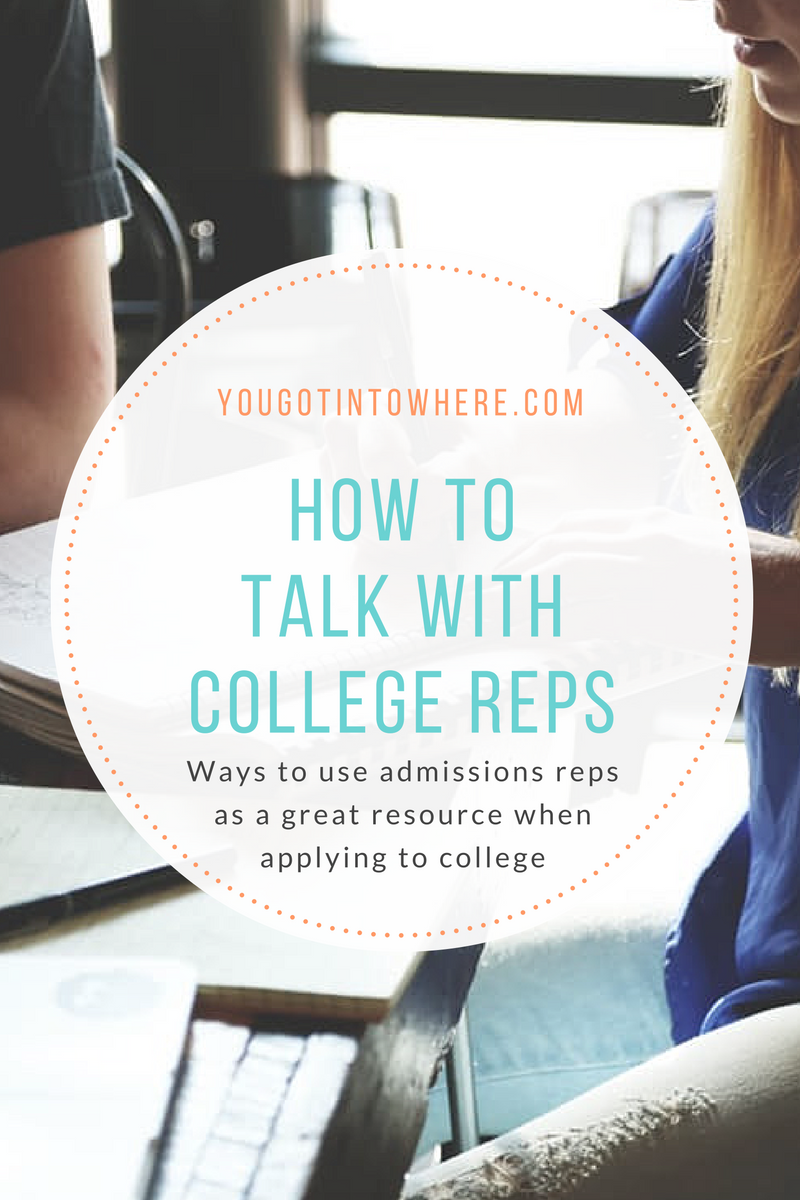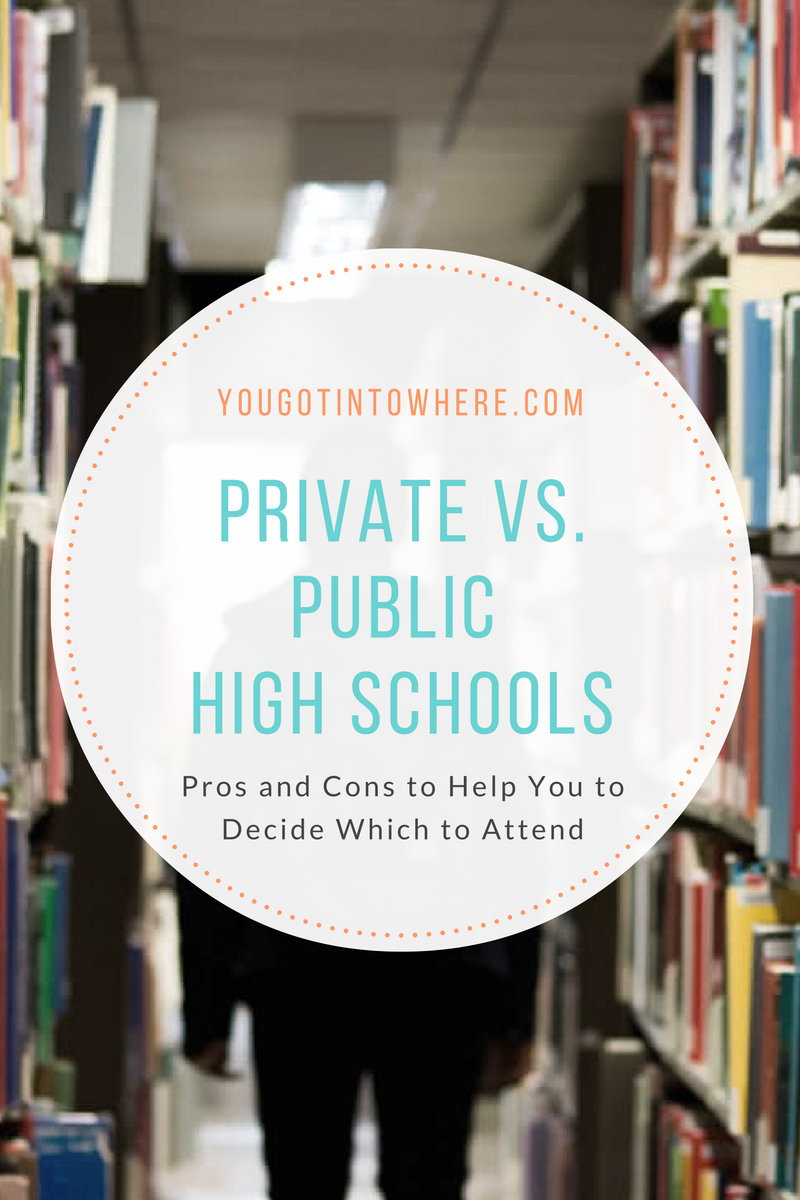3 Easy Ways to Finish Your Senior Year Strong
/Three tips seniors can use to finish the second semester strong. #senioryear #academics #Classof2017
Read MoreYou Got Into Where? is a college admissions advice blog for high school students created by Joi Wade. Topics include the college search, SAT and ACT, college essays, the common application and college scholarships.
Three tips seniors can use to finish the second semester strong. #senioryear #academics #Classof2017
Read MoreLearn more about some of the top colleges with undergrad engineering programs. Each school holds different opportunities for aspiring engineers. Find the school that’s right for you!
Read MoreThose that speak more than one language are at an advantage than those that don’t. College is a great place to learn a new language. This post provides the top (private and public) colleges for Foreign Language majors.
Read MoreCollege classes should not be feared! Here are 5 differences between high school and college classes, with some tips.
Read MoreA Communication major is broad enough for you to have countless options after graduation. Courses in journalism, mass communication, public relations, and advertising will guide you to success within the government, healthcare, Internet Marketing, mediation, nonprofits, business administration, and more. Here is a list of the current top ten universities in America for a Communication Major, along with their course requirements.
Read MoreA conveniently compiled list of 5 summer programs for high school musicians. Many high school students use summer programs as a way to gain experience and knowledge in their desired field of study. If you are a high school musician, this post will explore 5 of the most well-renowned summer music programs in the United States for you!
Read More
Oh, how time flies. Just yesterday you were a freshman excited about high school and look at you now, about to be a senior; they grow up so fast. You can’t have fun just yet. 15 tips will be provided, advising you to make the best decision to finish junior year off strong! Tip #1: Stay Focused and Make Goals
Junior year is the most stressful year of high school. With the ACT and SAT, college admissions, scholarships, and society, it’s extremely easy to lose focus on the bigger picture. Remember why you need this last semester to be perfect.
Tip #2: Get Organized!
College mail, test prep materials, study guides, and scholarship information can pile up rapidly making a cluttered mess. Junior year is not a time to have clutter! Grab all those loose papers and find a nice comfortable place to sit. Make a “trash” pile and a “keep” pile and divide the loose papers into those two categories.
If you don't have one already, get a good planner. You can use planners track your homework, events, holidays, and much more. Here’s a good article to show you how to organize your planner. Don’t see a planner you like? No worries, you can use a personal journal and decorate it to your liking. Here’s an article showing you how to make and use a bullet journal.
Tip #3: Begin Thinking About College
Don’t fall behind the rest of your peers by skipping out on the college search. The college admissions process is competitive and gets even more competitive the closer it gets to application season. You can access college websites and forums discussing colleges. Here is an article on choosing the college best fit for you.
Tip #4: Visit Colleges
College visits are highly important. They can make or break your decision on a school. If you walk on campus and you just get a feeling of home that usually means this is the school for you. You also can get first-hand testimonies from current students and can meet different reps from the school. Who knows, you might just stand out on the visit and get a surprise email from the admissions director. Visiting colleges aren’t always accessible to everyone. Here is an article about learning about colleges without visiting them.
Tip #5: Begin Looking for Scholarships
On the YouGotIntoWhere? blog, monthly scholarships are posted to help you with the scholarship hunt. There are many websites that match you with scholarships. Scholarships.com, Fastweb.com, Cappex.com, and CollegeGreenlight.com are common sites to find scholarships. Also, check to see if your local banks and churches offer scholarships. Here’s an article to assist you in search of scholarships. Don’t get discouraged or frustrated. Good luck!
Tip #6: Prep for Standardized Tests
Tip #7: Begin Asking for Recommendation Letters
Your favorite teacher, your track coach, your vocal coach, your pastor, or even your supervisors are good people to ask for recommendation letters. Colleges and scholarships both as for recommendation letters.
An article was written about a beginner’s guide to recommendation letters. You should check it out.
Tip #8: Meet with your Counselor
The good old counselor, your best friend throughout your junior year of high school. You should meet with them initially to make sure you are on the right path to graduation. They can motivate you, and essentially they can make the second semester of junior year easier for you. Building this relationship also means you can have another person who can write you a recommendation letter.
Tip #9: Expand your Resume
Expanding your resume means to add more things on your resume to make you stand out in the application pool. As a junior in high school, a resume is a must. It can be used to get jobs, to get internships, to get recommendation letters, and to get admitted to colleges. For colleges, an activities resume will be most common. There are many templates out there in the world for activities resumes but if you like to make your own from scratch, here’s a guide for you to use.
Tip #10: Get More Involved
Join more clubs and extracurriculars in your school and community. Clubs and extracurriculars on your resume show that you want to learn outside of your required eight hours. It also shows your initiative to better yourself. The longer you’re in a club, the better.
Attempt to become the president, vice-president, secretary, or treasurer. For sports teams, try to become captain or co-captain.
This will tell you everything you need to know about choosing the right clubs.
Tip #11: FAFSA?
Yes, the Free Application for Federal Student Aid. FAFSA is what colleges will use to accept and award financial aid to you. The application opens October 1st of every year. This will explain what FAFSA is.
Tip #12: Find a Form of Income
There are many articles about getting part-time jobs in high school but here is the article I wrote on making an income during high school. My parents won’t let me get a job? There still are ways to find income. You can babysit, house sit, or pet sit. You can become a tutor and more. There are pros and cons of having a job in high school.
Tip #13: Get Closer to Your Classmates
These are the people who will walk across the stage with you. These are the people who you will see at your class reunions. These are the people who will support you in life. If you haven't made good friendships yet, now is a great time to start.
Tip #14: Get Healthy
You should pay attention to your body's physical and emotional needs due to the stress that you will be under from school work, activities, and more. Exercise, eat healthy, and talk to someone if you are not feeling as happy as you believe you should.
Tip #15: Relax and Have Fun Finishing junior year of high school is stressful but it doesn’t have to be the death of you. You don’t have to think “do this, do that, I need to find this, I need to stand out” every day. Devote days or hours to relaxing, and no, sleep does not count. Meditation, running, cleaning, and doing any of your hobbies are good ways to relax. There is an article on de-stressing or relaxing productively.
I hope you enjoyed my 15 tips on finishing your junior year of high school strong. You will do good this semester; I have faith in you. Good luck!
Whether your teacher is giving a lecture or you’re studying for an exam, note-taking will always be an essential part of the academic experience. However, students may find themselves unsure of how to take notes effectively and efficiently. This post discovers tips to keep in mind when taking notes.
Read More
Although it may seem early to start preparing for AP Exams, May will be here before you know it. The earlier you can start preparing, the better off you will be when it comes to actually taking the test in a few months. With that being said, many of us don’t even know where to start when it comes to preparing for exams. In hopes of helping everyone out, I have a few tips on how to start preparing for AP Exams.
If you don’t know where to start when it comes to preparing, a prep book is probably the best option. Prep books, or review books, are basically books with a shortened and simplified explanation of everything that will be covered on whichever AP Exam you are taking, as well as some practice exams or materials.
Before using the prep book, you need to find the right one for you. Barron’s and Princeton Review’s review books are arguably the most popular; however, there are many others published by different companies. To choose a prep book, I would ask people who have previously taken the course which one they found most helpful if they used any. If no one you know has taken the AP Exam you are planning on taking, read reviews of the books online. However, when you are taking advice from others remember to take it with a grain of salt and gather your own opinion based on many sources. Ultimately, you probably won’t know your preference until you have the book in your hands.
Once you have chosen the book that you want to use to start preparing, you need to actually obtain the book. If money is an issue, many libraries do have prep books that you can borrow. If they don’t have the specific book that you need, many libraries will order one for you if you request it. The downside to borrowing a book is that you cannot write on the practice exams or highlight and annotate the actual book. If this is not a problem, then borrowing is a free option! If you are willing to shell out some money to purchase your own prep book, then that is a great option as well. Having your own prep book means that you can write and highlight in the book. This can be especially helpful if you like highlighting essential information to refer to later. Often, amazon.com has the best deals on prep books, as well as fast shipping. However, if you want to make sure you are getting the best deal, you can utilize the website slugbooks.com. Just type in whatever prep book you are looking for (ex. Princeton Review AP European History) and it will pull up price comparisons from across many different websites so that you can purchase your study materials at the best price!
Now that you have your prep book, using it should be pretty straightforward. Many books provide test-taking strategies, which would be great to read at this point, as AP Exams and tests that you take in class are often two very different things. Read the material that you have covered in class up to this point. Most likely, your textbook does not cover everything on the AP Exam, so doing this will ensure that you have a more complete perspective of the information. It also doesn’t hurt to take one or two of the practice exams, if your book has one. This could give you an early evaluation of where you are so that moving forward, your studying can be more focused and relevant to your struggles. Keep coming back to your prep book as the AP Exam approaches, it will be a useful tool in preparing you utilize it in its entirety!
Another great resource for preparing for AP Exams is the College Board website. The College Board is the organization that creates and administers AP Exams, meaning that they have a wealth of inside information on their website.
To utilize the website’s tools, go to “AP Courses” (https://apstudent.collegeboard.org/apcourse). Under this link, there are all of the AP courses that are offered. You can select whatever AP course you are taking and utilize several resources there. For example, under every AP courses link, there are four tabs that are very useful. The tabs at the top are “Course Overview”, “Course Details”, “About the Exam”, and “Exam Practice”. All of these have extremely valuable information. Read all of these tabs to familiarize you with the exam, as well as providing a focused overview of the course. This is important to look at when you start reviewing, as you will get a sense of the general topics that are most important in the eyes of the College Board. As I said, they are the ones who create the test; so knowing the overview and the topics that they find valuable can be a great tool.
Finally, something that you can do to prepare is making graphic organizers! Graphic organizers can be a way of organizing information visually in a way that makes sense to you. I recommend making these when you begin to review, as it is a great way to force yourself to look at all of the information that you have and to organize it comprehensively. For example, if you are taking a history exam, try putting all of the relevant historical events into a master timeline. Or if you are taking a science exam, you can organize notes by-laws, theories, etc. This is a great option for last minute studying, as it allows you to have an overview of what you are learning, as well as review all of your materials.
I wish everyone the best of luck on your AP Exams! Happy studying!
For more advice on AP Exams, check out these articles as well:
AP Human Geography: A Guide to Success in the Course and Exam
AP Overload: 5 Tips On How To Push Through a Rigourous Courseload
In the midst of a stressful school year, you may find yourself stuck with grades that you are unhappy with. Here are some tips to help bring your grades up.
Read MoreExplore the 6 things I wish I knew before starting my college applications which could have helped me avoid stress. The process was a learning experience. This post will help others not make any of the mistakes I made when I began my college applications.
Read More
It is now winter break, which means that the first semester of the school year is just about over. Numerous college acceptances have been sent out, breaths of relief have been released, and many students are now ready to coast through the second semester until graduation. Admittedly, it’s hard not to get in a relaxed mindset after being accepted to college; you worked your hardest to get the GPA and test scores that you wanted, and you deserve a bit of loosening up, right? The fact of the matter is that it’s one thing to ease up on yourself now that you’ve crossed a major bridge and another thing to fall into a slump where you begin to slack off in your academics. The latter is a prospect that should make you uneasy. It definitely makes me uncomfortable, so here are the ways I plan to avoid senioritis and finish out my senior year with a bang!
In order to keep myself from losing motivation throughout the rest of my senior year, I have started making reachable goals that I can accomplish and feel proud of. For example, I am now aspiring to make a high A in my AP Probability and Statistics course instead of the lower-range A that I usually get. It’s nothing major, but it gives me something to work towards that will make me feel happy in the end. By creating these little objectives, I can ensure that I will not lose interest in my classes and will continue to try my very hardest.
Organization is a huge part of my life that keeps me driven all the way up until the finish line. In school, I stay organized by using a nice eye-catching planner and colorful pens to make sure I remember all of my assignments. Before I used a planner I felt like I was stumbling through my academics, but now it’s smooth sailing and I am always eager to cross off every item that I write down. Even now, during break, I use my planner to plan out my schedule for each day so that I can stay productive while I’m not in school and keep up with scholarship deadlines. It keeps both my mind and my goals in check, and I cannot recommend to you enough that you should get a planner as a first step to being organized and staying motivated!
A messy backpack, locker, or desk can also lead to a decrease in motivation, for as crumpled papers pile up you’ll continue to procrastinate in cleaning and have a disorganized mind as a result. By keeping everything in order, from assignments to permission forms, you will be on the top of your game when it comes to all aspects of your life!
I might be a bit paranoid, but even the slightest prospect of having my college acceptances revoked is enough to scare me into doing the best that I can. Senioritis hits some students that hard, though, and they can be threatened if their grades slip past a certain point. In general, just knowing that my guidance counselor has to send mid-year and final reports on my grades to colleges, forces me to snap out of any state of stagnation I am in and keeps me running with my eyes on the prize. It’s important to remember that colleges don’t just accept you and forget about you until your enroll, and instead continue to monitor your grades and make sure that you don’t slip up.
Now that I’ve reached the home stretch of my high school career, I’ve been putting a lot of thought into the future. I think about how hard I’ve worked to get to this point and how I don’t want to diminish that by slacking off now. Furthermore, I don’t want to set a precedent for my freshman year of college, which I am now counting down the days to in pure excitement. If I don’t put in my best effort now, who knows what I’ll be like when I start college next year? You do not want to go into college feeling like you can’t try your hardest, so I recommend keeping your future in mind as you finish up your senior year. A strong conclusion to it will practically guarantee a strong beginning to the next chapter in your life, and if you invent your best self now, you’ll definitely shine bright later in your higher education.
I plan to follow through with all of these points so that I don’t become a victim of senioritis, and I know that you can too! It may seem tiring to trudge through your responsibilities when all you want to do is coast until graduation, but your last semester in high school is just as important as the previous ones. It’s now or never; you only get one shot at having a great senior year, so make sure that you make it the best that you can!
Many people lose their motivation when they're not in school. Make sure you use your breaks to keep your brain active. This post will give your several ways you can stay productive during Winter Break. #winterbreak #productivity
Read MoreWith a new year comes new goals. Tired of abandoning your goals just a few weeks into the year? Learn how to set resolutions that you can stick to throughout the whole year and make 2017 yours!
Read MoreThree factors to consider so that you can pick the right college. #collegeadmissions #choosingacollege
Read MoreThree ways that all students can use psychology to pass their next test. #studyingtips #testtakingstrategies
Read More
There can be a number of intimidating encounters that you will experience along your college admissions journey; among them is when you’re directly communicating with college admission representatives at college fairs. You may feel as though you have to be careful with your words and the way in which you present yourself to them, or that they come to college fairs to hunt down information on prospective students. However, these common misconceptions are false. College representatives come to college fairs simply as resources. All they want to do is provide you with as much information about their school as they can and to answer any questions or concerns that you have. They are not there to find out your deepest darkest secrets and put your name on a list of future rejections. So no need to fear, here’s a guide on topics you can discuss with college representatives.

When speaking with an admissions representative, you should always ask questions that are specific to the particular college or university that they are representing, rather than asking broader, general questions that can simply be answered on the College Board website. For example, instead of asking what the GPA or SAT/ACT standards are for that school, ask about the kinds of aspects that the school particularly looks for in prospective students. Try asking more open-ended questions rather than yes/no questions so that you are given as much information as possible.
You should also do a bit of research on the colleges that you are interested in looking into before you attend the fair, so that you have a better understanding of the school as well as some things you may want to ask the representatives. Ask them about specific academic programs at their school or the campus environment. Not only does this allow you to have more accurate information, but it also shows the representative that you genuinely have an interest in that particular school. Don’t worry too much about that last part though; like I said, they’re not hunting for prospective students. This is just something that they appreciate, and may take note of when they review your application. However, do not be afraid to talk to representatives from schools you have never heard of because you might end up liking it a lot more than other schools you researched.

More than anything, the discussion between you and a college representative is nothing more than a conversation. So don’t treat it as if it’s an interview that your whole future depends on. Act casually, and speak to them like they’re actual people that you’re interested in speaking to. This doesn’t mean that you should rest your feet on a table and share a joke or two with them, however. It’s just important to keep in mind that these people are just here to help you; nothing more, nothing less.
So just keep in mind that college representatives are simply sources of information about particular schools, and there's absolutely no harm in speaking with them. You'll probably leave the college fair with so much more information than you expected if you do.

Private vs Public. This has been a debate that has been taking place from the beginning of the rise of the educational system that has been present in our country since the early 1900s. What once was a one-for-all education in a town schoolhouse, turned into the formation of city and state funded public schools, which led many parents to consider an alternative education experience to what their city provides- private school. Now I am a self-proclaimed, ‘’private school girl”. However, it wasn’t always that way, because I was fortunate enough to attend two of my city’s three magnet schools while at the elementary level. Once time for middle school came around, rumors of my city’s ‘’bad’’ middle and high schools broke out. I heard about gangs, drugs, and bullying worse than what I was currently experiencing in elementary school. My brother had attended private school all of his life, while I, thinking private school, is ‘wack’, decided to stay enrolled in the public school system until I graduated elementary and then switch for middle and high school.
This September marked six years since I have been enrolled in private school, and I’m proud to say that I feel, my parents and I have made the right choice. Many people felt uneasy upon hearing my desire to leave public school, with declaring statements such as ‘’it’s a waste of money’, or that it wouldn’t benefit me any more than public school did. They also marvel at the fact that I wake up earlier than most teens do, just to be able to travel from my home in suburban New York, (Westchester County), and into the hustle and bustle in Manhattan (where my school is located). As I have previously stated, I personally have discovered that private school is the right fit for me, and I have written this article to dispel any myths that may stand in the way of deciding between the two.

Now this is just a hasty generalization (yes, and ode to AP English!). As always, there are plenty of shows, one example being Gossip Girl, which show private school to be a haven for the wealthy and social elites. Do not be fooled by this-- many individuals who attend private schools are scholarship students, meaning that they really can’t afford to be there. I, for, one am a scholarship student. Upon graduating from middle school, my parents, who were having financial issues, did not know whether I would be able to continue in private school or not. Luckily, I was contacted by my current high school and I received a scholarship that has been a big help to my family financially.
Don’t be blinded by the hype of the media. Private school students are just like every other kid, most aren’t rich or ‘’privileged’’, but have just chosen that particular educational route.
Although most private schools do wear uniform, many do not. There are Montessori Schools, and other independent schools that do not place a uniform requirement on your schooling. If you are someone with a passion for fashion, who thrives on other’s compliments of their outfits, accessories, e.t.c., then private school can still be an option. Some have a uniform that is optional but not mandatory; others have mandatory uniforms, while others have no uniform at all. Never let a fear of uniform influence your high school decision, because uniform isn’t even a factor in some private schools.

This myth is completely subjective. Yes, some private schools can be more academically challenging than public schools, but this isn’t a one-size-fits-all deal. Not all private schools are rigorous, or better academically, than a public school. I wouldn’t advise anyone to weigh the academic rigor of a high school, or any school, based on whether its public or not. The amount of academic rigor that a school has in its curriculum is unique to every school. Some schools have numerous AP courses, other schools have very few. Some promote the IB diploma, while others recommend dual enrollment. Beyond the private and public school spheres, there are many different types of high schools, all which vary in rigor. Some are rigorous, others aren’t. A private school isn’t necessarily more rigorous than public school, and vice versa.
Now this is just one big lie. This is a lie that almost stopped me from applying to the private high school that I currently attend now. While in eighth grade, I was told that top ranked colleges (Ivies, Stanford, and such), do not admit private school kids, that they prefer those who make do with what they have been given, which is the reason why they are said to ‘’prefer’’ public school students.
There are plenty of great public schools, but my city just doesn’t have them. My deciding on attending private school was influenced by my strong desire to learn, which I felt would be put to use in classes with smaller class sizes.
I knew I wanted to attend private school, but I had thought that I ruined my chance at top college admission because of it. Little did I know, there have been the occasional alumni of my school that have went on to attend prestigious institutions such as Harvard and Columbia. It is extremely rare, but it does happen.
College admissions are based on a holistic review, meaning that they take everything into account, starting with the high school you attended. Do not fear, colleges aren’t looking to expel public school applicants, admit private, or vice versa, they are looking for a diverse class, filled with students from all walks of life. Going to a public or private high school will not be an advantage or disadvantage when pertaining to college admissions.

Now we have come to the end of our article, the point where you decide if a private or public school education is right for you. Whether you are looking to start high school or college, here are some factors to consider when deciding to take the private vs public school route.
A. Can I survive in a large school?
Private schools tend to be small, while some public schools house as many as 5,000 students. If you hate the impersonal feeling of a large school and thrive in a more intimate environment, then private school may be a viable choice for you.
B. What class size suits me best?
Some people thrive on lecture style classes, and can still stay in tune with a professor despite being surrounded by a large group of students. Others prefer a smaller, more intimate, classroom setting, one open for discussion and comments on observations.
C. Is religious education important to me?
Many private schools enforce religion into the curriculum, public schools do not. Is religion important to you? Would you like to be surrounded by students and teachers who share your faith/religious beliefs?
Those are all things to think when considering any school, whether private or public. I hope this article can get you one step closer to making your choice.

Do you ever wonder why you think differently than others? Or why you make decisions based on your feelings rather than logic? Or why some people see a different meaning in certain concepts than you do? Well you no longer have to question these things. The Myers-Briggs Type Indicator (MBTI) is a personality type test that provides you with information about the different ways that you think and how these different aspects can affect your actions and decision-making.

All you have to do is take a quick personality test on the 16 Personalities website (16personalities.com), and you’ll receive a personality type that consists of 4 letters (for example, ENFP), with each letter representing a certain trait that you have based on the answers that you provided. You’ll be surprised to see how accurately the results describe you! Just make sure that you are as honest as possible in your answers. Knowing the kind of thinker you are can definitely benefit you in your academic experience and will allow you to have a better understanding of your own learning abilities as the learning abilities of others.
The first of the four letters will either be an “I”, representing introversion, or an “E”, representing extroversion. This trait tells you the kind of environment that you are more comfortable to be in. If you are an introvert, you prefer to spend time alone and are often under stress in social situations. You spend lots of time thinking deeply about things that don’t regard your surroundings, and find peace in being alone with your thoughts. Being an introvert is beneficial because it allows you to work independently and rely on solely yourself, however it may hinder your ability to communicate with others effectively. If you are an extrovert, you prefer to spend time with large groups of people and dislike being alone. You focus most of your attention on the “outside world” and your surroundings, and rarely spend time going into deep thought. It is easier for you to communicate and socialize easily, but you often have difficulties being independent.

The next letter in your personality type is either “N”, meaning intuition, or “S”, meaning sensing. This determines the way that you perceive and react to information. If you are an intuitive thinker, you tend to take information that is provided to you and find a deeper meaning in it. You look beyond what is physically presented, and are drawn toward abstract ideas and metaphors as opposed to real experiences and facts. You are open to new possibilities and focus more on the future and the outcome of things rather than the present. This trait is helpful in situations that require creativity. If you think through your senses, you prefer to focus on the literal aspect of things. When given information, you work with what you have instead of looking for multiple meanings in it; you want to understand the factual aspects of things. You want to get to the direct point of things instead of analyzing them in more depth. You trust facts and reality more than you trust ideas and possibilities. Perceiving information with your senses is often beneficial when you need to make critical decisions regarding professional matters.
This third letter reveals how you make decisions. If you make decisions based on thinking, you tend to analyze situations based on the pros and cons, and try to make the most logical decision with what you are provided. You focus on the elements of the situation itself rather than any personal opinions, including your own. Similar to the P trait, this trait is very helpful in making decisions that require logic and rational thinking, but it may cause conflict in sensitive situations where it is critical to understand the people that are involved. In contrast, if you make decisions based on feeling, you deeply consider the people that are involved in the situation and tend to make decisions in their favor, or in your own favor. You don’t think too much about the rational aspects of a situation; you make decisions based on your beliefs and what you feel is right. The feelings of yourself and of others are a priority over what is logically correct. This is beneficial when addressing sensitive situation, but when making decisions that require logic, personal feelings might get in the way.
The last letter represents your behavior and the lifestyle you choose to live. If you are extremely organized in all your decisions and have a need to plan things out before they happen, then you have a judging preference. This means that you are very task-oriented and prefer to do things ahead of time. This can help you in managing your priorities and getting work done when it needs to be. If you prefer to “go with the flow” of things, and dislike making definite plans, you have a perceiving preference. You like to live freely and allow experiences to happen without knowing they will ahead of time, and you do what you can with what comes to you. This trait allows you to adapt to a variety of different situations and handle them efficiently.
With all of this information, you now have a clearer understanding of the type of person you are and why you have the different tendencies and habits that you have. Now that you understand your strengths and weaknesses better, you can use the traits that you have to your own advantage in the academic environment. The 16 Personalities website provides you with a more detailed description of each personality type as well as each individual personality trait. They even provide you with useful information about what your personality type is capable of by listing possible career paths that you would excel in based on your traits. You can look through these careers and see if any of them interest you. If they do, try to find activities or extra curriculars that are similar to those listed and see whether you can truly excel in these subjects or not. Having a better understanding of your own mind is definitely beneficial to your learning experience and career path.
Not only will the 16 personalities website inform you about your own character traits, it can also help you to understand the traits of others and why they act or think the ways that they do. Understanding the way others think can be advantageous in high school and college, especially in the learning environment. It can allow you to clearly see and comprehend opposing sides of an argument, and it can allow you to make unbiased judgements. It can also help you to understand people on a more personal level. For example, this can help you understand your roommate a lot better.
Overall, understanding your own skills, traits, and weaknesses can help you in numerous ways.
Link to website: https://www.16personalities.com/

AP Psychology is said to be one of the easiest exam there is, as far as AP Exams go. The AP Psychology exam is all about testing students' knowledge of the 14 key topics outlined on the College Board description of the course. AP Psychology is meant to be give the students willing to take up the challenge of a college-level class. In this article, I will talk about the 14 topics as well as the percentages of the test devoted to each topic. This article will be followed with more articles about my experience and the exam.
This topic takes up 2-4 percent of the test and talks about the different theories that psychologists used to explain the mental processes. They also talk about the different approaches used to collect data along with the important figures of psychology.
This topic takes up 8-10 percent of the test and talks about the different types of research and their importance to gather data and how to apply the research develop theories to explain behavior.
This topic takes up 8-10 percent of the test introduces the different physiological processes and their relationship to behavior. The different physiological processes include the brain, nervous system, and genes and how they contribute to behavior. This is one of them most parts the curriculum. This chapter also includes important figures.
This topic takes up 6-8 percent of the test and talks about the different sensory processes as well sensory disorders. They also talk about how experience and culture can influence perception. This chapter also includes important figures in sensation and perception.
This topic takes 2-4 percent of the test and talks about the variations in conscious including the sleep cycle, dreams, hypnosis, circadian rhythms, and the effect of psychoactive drugs. This chapter also includes important figures in consciousness research.
This topic takes up 7-9 percent of the test and is also one of the most important topics. This topic introduces the difference of learned and unlearned behavior. It focuses on the different kinds of learning. This chapter also includes the important figures in the psychology of learning.

This topic takes up 8-10 percent of the test and teaches the student how humans convert sensory inputs into information. It talks about how humans learn, remember, and retrieve information. This chapter also includes the important figures in cognitive psychology.
This topic takes up 6-8 percent of the test and allows student to learn about the biological and social factors that motivate behavior. It also talks about the biological and cultural factors that influence emotion. This chapter also includes important figures the psychology of motivation and emotion.
This topic takes up 7-9 percent of the test and talks about the behavior from conception to death and how different processes that contribute to behavior changes. This chapter has a heavy emphasis on prenatal development to adulthood. This chapter includes important figures in development psychology.
This topic take up 5-7 percent of the test and explores the theories of how humans develop patterns of behavior and personal characteristics that influence how other relate them. This also discusses the research methods used to asses personality. This chapter includes important figures is personality figures.

This topic takes up 5-7 percent of the test and talks about the theories of intelligence and the different type of intelligence tests. This chapter includes the important figures in intelligence research and testing.
The topic takes up 7-9 percent of the test and talks the different disorders ranging from mood disorders to personality disorders. It also talks about the approaches to explaining psychological disorders. It also discusses the consequences of label and how the legal system views mental disorders.
This topic takes up 5-7 percent of the test and talks about the treatments of psychological disorders. It talks about the different types of therapy and the effectiveness of the specific treatments. This chapter includes important figures in psychological figures.
This topic takes up 8-10 percent of the test and discusses how people relate one another in social situations. It talks about the social psychologists and what they study such as social attitudes, social influence, etc. This chapter includes the important figures in social psychology.
I hope these tips will help you and I hope you come back for the other article. This information comes from the College Board description of the course. Leave a comment down below if you have any questions. And as always make sure you follow us on Instagram and Facebook.
You Got Into Where? is a college admissions help website for high school students who want admission and scholarships to their top-choice universities. Get help on the SAT and ACT, college essays, the common app, scholarships and more.

Searching for transparent posts from a student's perspective on how to search and apply for colleges AND get scholarship money? You've come to the right place. Learn more...
Privacy Policy - Terms of Use - Jobs & Internships
Copyright 2018 | You Got Into Where? by Joi Wade